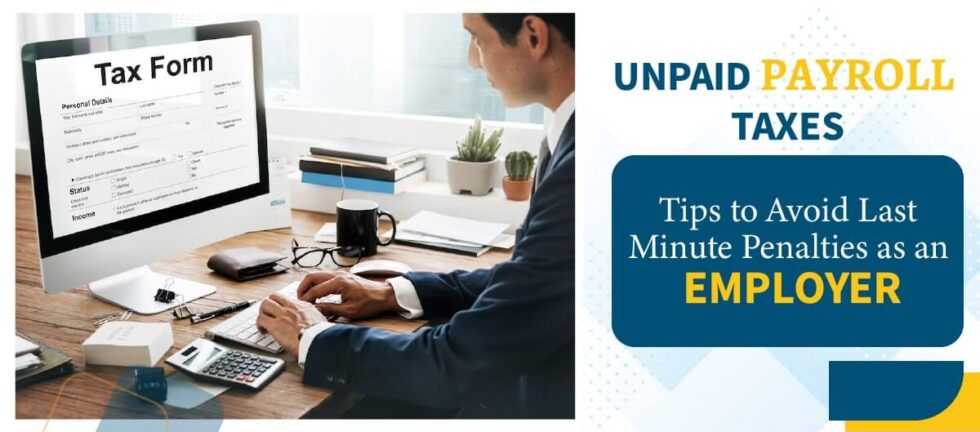With all the responsibilities you have as the owner/manager of a business, it can be easy to run into problems with the unpaid payroll taxes for your business. The current US Tax Code requires all businesses in the United States to file 941/940 Payroll Tax Forms with the IRS each quarter and at the end of the year. These can be complex and time-consuming regulations to keep up with, and it is critical to have payroll employment tax help.
Small business tax services can really save you when it comes time to square away your company’s payroll taxes. This is particularly true if you need unpaid payroll tax help. In this article, we will look at some tips to avoid last-minute penalties as an employer.
Why Small Business Payroll Services are Important?
If you own or run a business, payroll taxes should be high on your to-do list. The IRS certainly prioritizes collecting form 940/941 payroll taxes! As your local tax representation firm will tell you, Payroll Employment taxes (typically called FICA) must be collected or paid to the Internal Revenue Service for every single employee. These include social security tax, Medicare tax, Federal income tax, and Federal Unemployment tax. Small business payroll services can help ensure that your business pays all these taxes on time, thus avoiding penalties.
Why do You Need Payroll Employment Tax Help?
We have said that it is important for you, as the owner/manager of a business, to stay on top of payroll taxes and submit the 941 payroll tax forms for your company. This is because if you do not pay the tax, the Internal Revenue Service can bring an action against you to collect the unpaid taxes. You are subject to civil and even criminal charges if the forms are not submitted. Your local tax representation firm can help you avoid that.
What if You have Already Run into Issues with Unpaid Payroll Taxes?
The Internal Revenue Service can use tax levies and tax liens against you or your business. A tax lien is a temporary tax on a specific property that is enforced until your debt has been paid in full, including interest and penalties. A tax levy is a more serious penalty. It is the permanent seizure of property, such as accounts receivables or bank accounts, to cover unpaid tax debt.
Before the Internal Revenue Service can enforce a tax levy, there are four conditions that must be met. First, the Internal Revenue Service has to send you a “Notice and Demand Payment” in writing of assessed tax. Second, you must refuse to pay the tax or fail to pay it. Third, the IRS has to send you a “Final Notice with Intent to Levy” and “Notice of Your Right to A Hearing” at least 30 days before the Levy. Fourth, the IRS has to send out a Notice of Third-Party Contact informing you that a third party could be used to collect the debt.
If you need unpaid payroll tax help because you are facing a tax lien or tax levy, you should turn to your local tax representation firm. They are led by attorneys, certified public accountants, and enrolled agents who can navigate the scary and complex process. You should seek their help as soon as you notice from the Internal Revenue Service. They help you ensure you respond properly and on time. They can help you avoid last-minute penalties.
Full-Service Tax Relief and Consulting Services for Business Owners
Howard CPAs help businesses of all shapes and sizes in Florida with a comprehensive range of business tax relief and consulting services, including payroll tax help, delinquency, tax filing errors, tax problems, etc. Call us today to schedule your online consultation.


